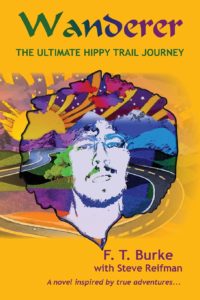 Wanderer: The Ultimate Hippy Trail Journey
Wanderer: The Ultimate Hippy Trail Journey
Writer: F.T. Burke with Steve Reifman
Publisher: Nightingale Press
Pages: 464
Year Published: 2018
Based on Steve Reifman’s personal notes from his own journey on the Hippy Trail, Woodstock goes on a year-long trip from the Netherlands to Nepal to find himself and God in Wanderer: The Ultimate Hippy Trail Journey. It’s a tale about spirituality, hippy culture, and humanity as much as it is about one man’s adventure.
F.T. Burke and Steve Reifman have provided readers with a look into what it was like to be a hippy. The traveling, the drugs, and sex are part of it; but underneath was a desire for connection. Connection, peace, love with humanity, as well as with the earth and God.
Throughout the novel, Woodstock searches for himself, and every drug-induced trip leads to a spiritual experience that is equally enlightening and terrifying. As a traveler myself, it was fascinating to see that not much has changed between now and the early ’70s. Making friends and traveling companions out of strangers, hostel parties, hitchhiking, trying to communicate through a language barrier–these all seem to be things that have lasted to the modern-day.
Perhaps I misunderstand the hippy culture of the ’70s, but it bothered me that Woodstock went on a supposedly life-changing adventure and that, once he returned, he was happy to conform to mainstream society. It felt like he was in a hippy “phase,” knew it was just a phase, and was content to cut his hair so he could start his career.
The authors of Wanderer seem to have an unconscious ethnocentric view with regard to how they view other cultures. They have often described many of the countries Woodstock visited as “primitive”–in particular, those third world countries that lacked many of the amenities and culture that Woodstock would have been familiar with. They even used “sitting Indian-style” to describe how people were positioned in a small party space the character attended.
Just a warning for folks: Wanderer showcases some of the dangers involved in traveling abroad, especially for women. One of Woodstock’s female travel companions experiences several attempted sexual assaults, and Woodstock himself also experiences attempted rape. I feel like the authors just brush these things under the rug. Woodstock mostly just looks disapprovingly at the would-be rapists or yells “I’m not gay!” rather than explaining why it’s wrong before going about his day. There’s almost an attitude of futility when these difficult situations occur like there’s nothing we can do about it, and it’s even more futile when there’s a language barrier. There’s no discussion about consent, though we can easily see the difference throughout the novel.
Woodstock also encountered a character who committed suicide in the Himalayas. This act has a much longer-lasting effect on the character, particularly as he sees all life as sacred. I’m glad they mention these things in the novel. Life and traveling aren’t without their hardships, so it’s good they included these things. But I think they could have been handled better.
Overall, Wanderer: The Ultimate Hippy Trail Journey is a riveting story about the hippy culture and one man’s journey to find himself and God. One part I find particularly enjoyable is when Woodstock refers to his travels as a Tolkien-esque adventure. It’s life-changing. This is a book I think everyone can enjoy and find inspiration.



![[ADVANCE REVIEW] ‘BEFORE HOUDINI’ IS A FUN, VICTORIAN SUPERNATURAL MYSTERY](https://geekd-out.com/wp-content/uploads/2019/05/9781683830634-1-150x150.jpg)
